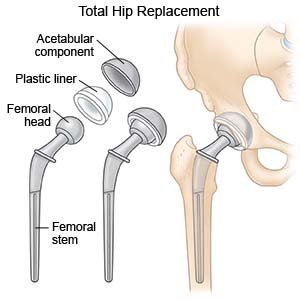Anterior Hip Replacement
Medically reviewed by Drugs.com. Last updated on Aug 4, 2025.
What do I need to know about anterior hip replacement?
Anterior hip replacement (AHR) is surgery to replace a hip joint damaged by wear, injury, or disease. The hip joint is where the top of your femur (thigh bone) sits in the socket of your pelvic bone. The joint is held together by ligaments and muscles. The top of your femur is shaped like a ball and covered with cartilage. Cartilage is a tissue that helps joints move.
 |
How do I prepare for anterior hip replacement?
Your healthcare provider will talk to you about how to prepare for surgery. He or she may tell you not to eat or drink anything after midnight on the day of your surgery. He or she will tell you what medicines to take or not take on the day of your surgery. You will be given an antibiotic through your IV to help prevent a bacterial infection.
Related medications
What will happen during anterior hip replacement?
- Your healthcare provider may use general anesthesia or a spinal block. General anesthesia will keep you asleep and free from pain during surgery. With a spinal block, medicine is injected to numb the body area where the surgery will be done. You will remain awake during the surgery. Your surgeon may use fluoroscopy (a type of x-ray) to guide him or her during the surgery.
- Your surgeon will make a large incision on the front of your hip. Your healthcare provider will move your muscles aside so he or she can reach your hip joint. The ball of your femur and the socket of your pelvis will be removed. A hip implant will replace the bones that were removed. Your healthcare provider may use medical cement to secure the implant parts. A drain may be placed to remove extra blood and fluids from the surgery area. Your incision will be closed with stitches or staples and covered with a bandage.
What will happen after anterior hip replacement?
You may be asked to get up and try walking within 3 to 4 hours after surgery. You may need to stay in the hospital for 1 to 2 days. You may go home when you can walk a certain distance and go up and down stairs. You will be given a walking device, such as a walker, after surgery. You will be encouraged to bear weight on your hip as much as possible.
What are the risks of anterior hip replacement?
You may bleed more than expected or get an infection. Your nerves, blood vessels, ligaments, bones, or muscles may be damaged during surgery. Nerve damage can lead to tingling, numbness, weakness, or burning along your thigh. You may have more hip pain, or your hip joint may become stiff or numb. The length of your legs may not be the same after surgery. Your implant may become loose or move out of place. If this happens, you may need another surgery to replace the implant. You may get a blood clot in your limb. This may become life-threatening.
Care Agreement
You have the right to help plan your care. Learn about your health condition and how it may be treated. Discuss treatment options with your healthcare providers to decide what care you want to receive. You always have the right to refuse treatment. The above information is an educational aid only. It is not intended as medical advice for individual conditions or treatments. Talk to your doctor, nurse or pharmacist before following any medical regimen to see if it is safe and effective for you.© Copyright Merative 2025 Information is for End User's use only and may not be sold, redistributed or otherwise used for commercial purposes.
Further information
Always consult your healthcare provider to ensure the information displayed on this page applies to your personal circumstances.
